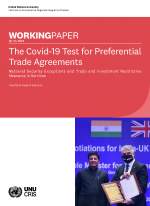Palacio Valencia, Ana Maria

Ana María Palacio Valencia was a virtual Visiting Research Fellow at UNU-CRIS. She obtained her PhD in Law at the University of Melbourne, Australia, with a dissertation examining the Pacific Alliance regional mechanism. The title of her thesis was: ‘Of Blind People, Elephants and the Pacific Alliance Integration: Institutionalist Account and Proposals for Change’.
She holds a Master of Laws from the University of Melbourne, graduate diplomas in business law from Deakin University and Externado University, and a Bachelor of Laws from EAFIT University in Colombia.
Prior to undertaking her doctoral studies, Ana Maria worked as a legal adviser for the Ministry of Trade, Industry and Tourism in Colombia on international economic law topics such as technical barriers to trade and services regulation.
She assisted the Colombian government in negotiating preferential trade agreements with the Republic of Korea, Panama, Turkey and the Pacific Alliance. Ana Maria has experience in private commercial law practice and has undertaken consultancy work for the Inter-American Development Bank, The McCabe Centre for Law and Cancer, the ECLAC, and Latin American regional think tanks.
Ana Maria is the editor and founder of the blog ‘Shaping the Pacific Alliance’. The blog engages with the general public by critically examining the agenda and ongoing work of the Pacific Alliance. It delivers updates on the news of the integration mechanism and provides an extensive online library of academic and general sources about the Pacific Alliance.
At UNU-CRIS, she was working on a project named Preferential Trade Agreements and the COVID-19 Test: Lessons for Trade in Services and Investment. She tested the proposition that preferential trade agreements (PTAs) and bilateral investment treaties (BITs) failed to adequately ensure/facilitate the flow of services and investments while safeguarding the state’s policy space to address the crisis. If so, the research explores key (policy and legal) challenges and bottlenecks in the international governance of trade in services and investment arising from the unilateral measures taken by governments in response to the COVID-19 crisis.

